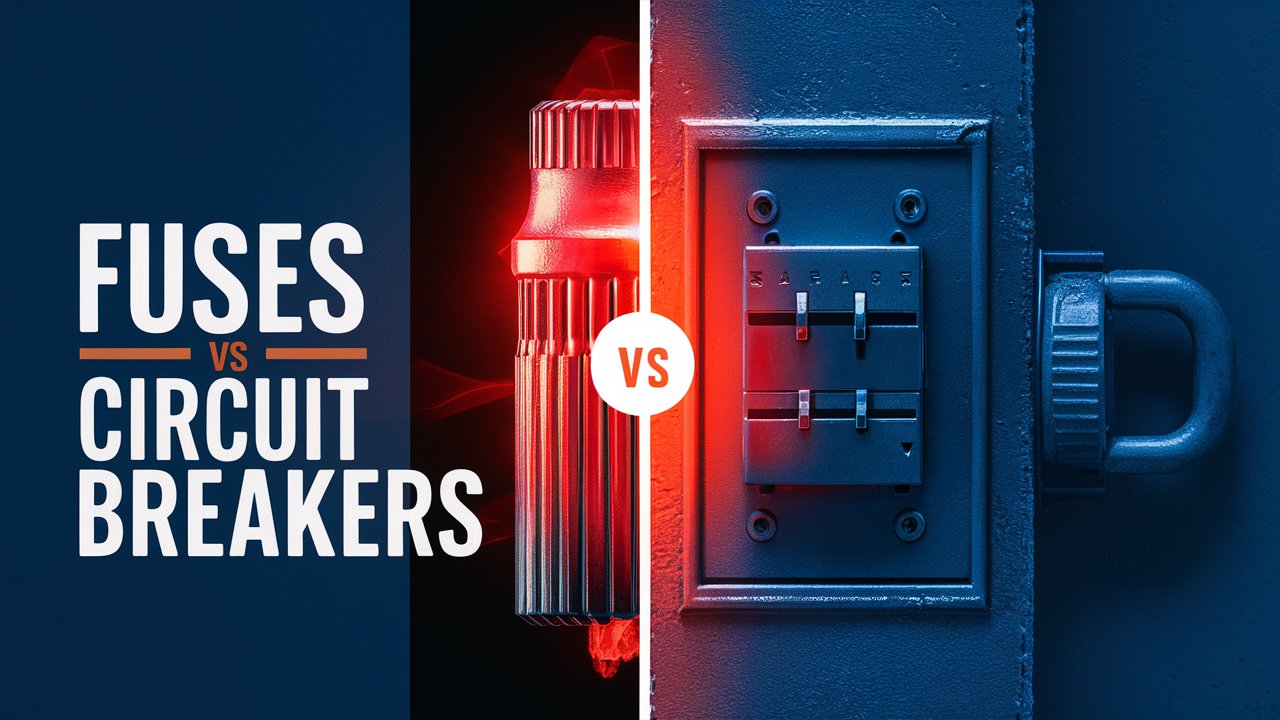Introduction
Electricity is an indispensable part of modern life, powering everything from household appliances to industrial machinery. However, it also poses significant risks, including fires and electrical shocks. Fuses and circuit breakers are crucial in mitigating these risks by interrupting the flow of electricity in case of an overload or short circuit. Understanding their importance helps in ensuring electrical safety and reliability.
What are Fuses?
A fuse is a simple yet vital device that protects electrical circuits. It consists of a metal wire or strip that melts when too much current flows through it, thereby interrupting the circuit and preventing further damage. Fuses are used in various applications, from small electronic devices to large industrial equipment.
Key Features of Fuses
Simplicity: Easy to understand and replace.
Cost-Effective: Generally cheaper than circuit breakers.
Single-Use: Must be replaced once they blow.
What are Circuit Breakers?
Circuit breakers are advanced electrical safety devices that automatically interrupt the flow of electricity in the event of an overload or short circuit. Unlike fuses, they can be reset and reused after tripping. Circuit breakers are commonly found in residential, commercial, and industrial settings.
Key Features of Circuit Breakers
Reusable: Can be reset after tripping.
Versatility: Suitable for various applications.
Advanced Protection: Can handle larger currents and provide more precise protection.
How Fuses and Circuit Breakers Work
Fuses
When the current exceeds the safe limit, the heat generated melts the fuse wire, breaking the circuit. This prevents excess current from damaging the wiring or connected devices.
Circuit Breakers
Circuit breakers use electromagnetic or thermal mechanisms to detect overloads or short circuits. When triggered, they trip a switch that opens the circuit, stopping the flow of electricity. They can be manually or automatically reset after the issue is resolved.
The Importance of Fuses and Circuit Breakers
Preventing Electrical Fires
One of the primary roles of fuses and circuit breakers is to prevent electrical fires. By interrupting the flow of excessive current, they stop overheating and potential ignition of wiring or surrounding materials.
Protecting Appliances and Devices
Both devices protect electrical appliances and devices from damage caused by surges and faults. This can extend the lifespan of these items and save money on repairs or replacements.
Ensuring Personal Safety
By preventing electrical shocks and fires, fuses and circuit breakers play a crucial role in ensuring the safety of individuals. This is particularly important in residential settings where vulnerable populations, such as children and the elderly, are present.
Maintaining System Reliability
Regular functioning of fuses and circuit breakers ensures that electrical systems operate reliably. This is critical for businesses and industries where electrical downtime can lead to significant financial losses.
Types of Fuses and Circuit Breakers
Types of Fuses
Cartridge Fuses: Used in industrial and commercial applications.
Blade Fuses: Commonly used in automotive applications.
Glass Tube Fuses: Found in older electrical systems and small electronic devices.
Types of Circuit Breakers
Miniature Circuit Breakers (MCBs): Used in residential and commercial buildings.
Residual Current Circuit Breakers (RCCBs): Provide protection against earth faults.
Molded Case Circuit Breakers (MCCBs): Used in industrial applications for higher current ratings.
Choosing the Right Protection Device
Selecting the appropriate fuse or circuit breaker depends on various factors, including the type of electrical system, the current load, and the specific protection requirements. Consulting with a professional electrician is recommended to ensure the right choice is made.
Maintenance and Safety Tips
Regular Inspections
Conduct regular inspections of fuses and circuit breakers to ensure they are in good working condition. Look for signs of wear or damage.
Professional Servicing
Hire a licensed electrician to perform routine maintenance and address any issues with your electrical system.
Avoid Overloading Circuits
Distribute electrical loads evenly to prevent overloading circuits, which can lead to frequent tripping of circuit breakers or blowing of fuses.
FAQs
What is the main difference between a fuse and a circuit breaker?
A fuse is a single-use device that melts and interrupts the circuit when overloaded, while a circuit breaker can be reset and reused after tripping.
Can I replace a fuse with a circuit breaker?
Yes, in many cases, you can replace a fuse with a circuit breaker, but it's advisable to consult a professional electrician to ensure compatibility and safety.
How often should I inspect my circuit breakers?
It's recommended to inspect circuit breakers at least once a year. However, more frequent inspections may be necessary in older systems or high-use environments.
What should I do if my circuit breaker keeps tripping?
If a circuit breaker keeps tripping, it could indicate an overloaded circuit, a short circuit, or a ground fault. It's best to consult a professional electrician to diagnose and resolve the issue.
Conclusion
Fuses and circuit breakers are indispensable components of any electrical system, providing critical protection against overloads and short circuits. They prevent electrical fires, protect appliances, ensure personal safety, and maintain system reliability. Understanding their importance and ensuring they are correctly maintained and chosen can significantly enhance the safety and efficiency of your electrical system.
To know more, watch our video on Fuses and circuit breakers : https://www.youtube.com/shorts/AtIOLMDgeh4
Connect with Us:
Visit Our Website : https://zenkaeurope.com/
Contact Us : info@zenkaeurope.com
Follow Us on Social Media:
Twitter : https://x.com/ZenkaEurope
YouTube : https://www.youtube.com/@ZenkaEurope
LinkedIn : https://www.linkedin.com/company/zenka-europe-uab/
Instagram : https://www.instagram.com/zenka_europe/
Facebook : https://www.facebook.com/zenkaeurope
